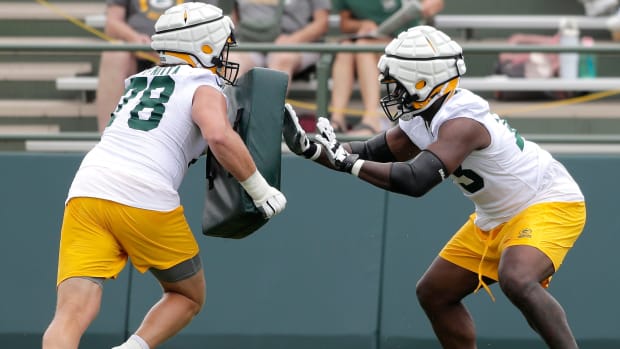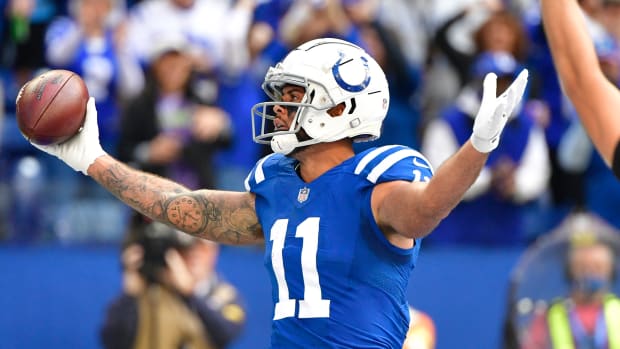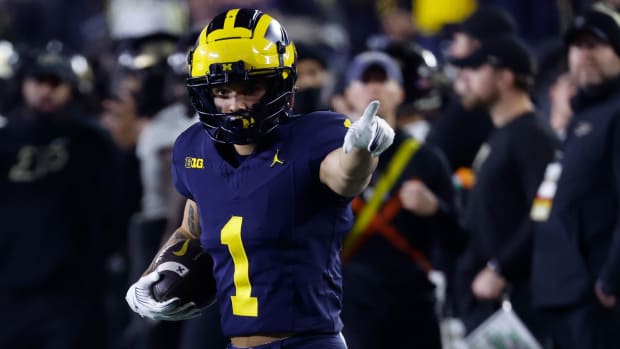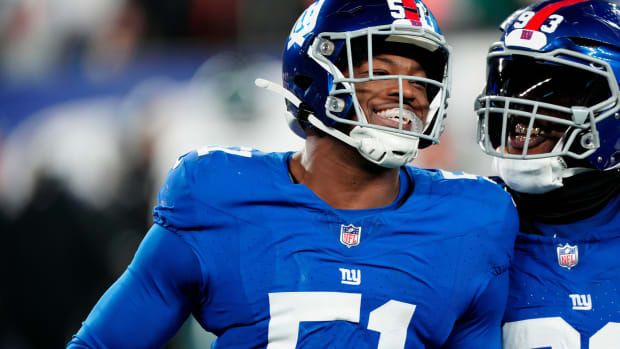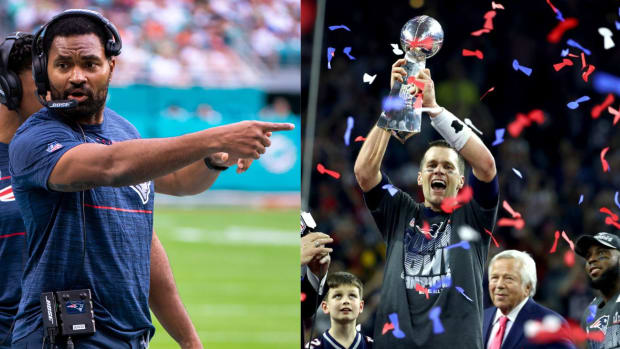Deshaun Watson’s Return Could Be a Living Nightmare for the Browns
Here’s a question I’ll bet the Browns have asked themselves only in the deepest corner of their darkest nightmares: Now that quarterback Deshaun Watson is returning from an 11-game suspension stemming from more than two dozen lawsuits detailing graphic accounts of sexual harassment and sexual assault, what happens if he comes back and his play on the field isn’t worth the headaches and the moral contortions it took to get him to Cleveland?
While this sounds laughable, especially for a three-time Pro Bowler and college national champion who will start his career anew against the worst team in the NFL, let’s remove what we know about Watson the player from the equation for a moment and consider a view from 30,000 feet. Cleveland is essentially paying the richest contract in professional football history for a player who will be 700 days removed from playing in a regular-season game, in an offense he’s never operated, against defenses that are stylistically different from when he last played. This is not an effort to minimize the on-field successes Watson has had in the past (indeed, he had a passer rating of 112 with 33 touchdowns and seven interceptions without DeAndre Hopkins, knocking down one of the flimsier arguments against his failing in his return), but it has to be on the list of items Cleveland was willing to deal with when it crafted its pro/con list.

Watson returns from an 11-game suspension on Sunday against his former team.
Corey Perrine/USA TODAY Sports
Watson succeeded in offenses heavily sampled from his time at Clemson, which, since Watson’s national championship, has sent dozens of players to the NFL. That offense and its intricacies have traveled far and wide. It is safe to say that what was potent in 2020 is not going to be as explosive in ’23. While not unique to Watson, think of the run-pass option, for example, which was so wicked five years ago that it jet-fueled an Eagles’ run to the Super Bowl with Carson Wentz and Nick Foles. The RPO has evolved multiple times in order to survive in a typical NFL playbook. Watson is joining an offense that heavily samples from the Gary Kubiak tree, which is adjacent to, and perhaps growing parallel to, the Kyle Shanahan tree. While not a true outside-zone system, the Browns draw from its principles.
So Watson will step on the field Sunday in a world where the system, or a relative of said system, is run by more than half the teams in the NFL. It will be studied, thoroughly, by every defensive coordinator in the NFL. What percentage of NFL coaches are still relevant, schematically, three years after their hiring? And of those who still are relevant, what percentage of them are Hall of Famers? What are the chances Cleveland is able to retain Bill Callahan, now 65 and one of the most sought-after offensive line coaches, year after year, in the NFL and as instrumental to whatever success the Browns have had as anyone in the building, deep into Watson’s contract to help keep the offense and its potent line working the way it should? What are the chances the Browns can continue to support one of the most expensive offensive lines in the sport (and their left tackle is still on a rookie contract, which will almost assuredly put them in the top three of positional spending) once the real portion of Watson’s contract tolls?
Watson was also dominant during an era of Seahawks-inspired Cover 3 defenses, which seemed to suffer against quarterbacks who could artfully extend plays. The league, during his absence, has almost exclusively shifted toward more of a big-play prevention defense, the likes of which we most commonly see run by Vic Fangio and his coaching tree. Watson faced a defense coached by Fangio once during his NFL career before his absence and suspension. He went 28-of-50 (56% completion rate) for 292 yards, one touchdown and two interceptions. It was the second-worst game in terms of quarterback rating he played in all season.
Watson is also 0–2 lifetime against John Harbaugh and 0–1 lifetime against Mike Tomlin, coaches he will be facing twice a year into his early 30s.
While not an apt comparison in any way except in that they spent time away from football, both Watson and Michael Vick missed two years in their prime. Vick had one very good season for the remainder of his career, at age 30, when he led the Eagles to a 10–6 record. At the time, Vick also had a 22-year-old LeSean McCoy, a 24-year-old DeSean Jackson and a 22-year-old Jeremy Maclin at his disposal. Watson will be returning to the field with a 27-year-old Nick Chubb, a 28-year-old Kareem Hunt, a 32-year-old Joel Bitonio (arguably Cleveland’s best offensive lineman), a 29-year-old Wyatt Teller and a 29-year-old Jack Conklin. The Browns rely heavily on a running game to propel their system and will almost certainly need at least one new running back and several wide receivers to match the talent level Watson was accustomed to at both Clemson and in Houston in the coming years. We are also in the midst of seeing how quickly one quarterback on a sure-fire Hall of Fame trajectory, Russell Wilson, can look human once he is removed from his element, and once his physical skills decline even slightly to the point where he cannot operate in the manner with which he is accustomed.
Of course all of these statistics and comparisons are conditional. Most of the sample sizes are small. I’m sure this headline will be used by the hive of Watson supporters who take to the internet and try to topple any piece of information that somehow paints their quarterback in a negative light (they’ve been busy), especially if Watson comes out and delivers as a player.
What we know for certain is there was a period of time when Watson was a great quarterback. It’s the entirety of the Browns’ plan, which hinges on Watson being so unbelievably good for so long that we forget about the circumstances by which they signed him and then protected him from financial loss with a creative structuring of his contract. What are the chances of Watson being so transcendently awesome, percentage-wise, versus the chances of Cleveland simply coming upon a good quarterback with no personal baggage, either via the draft or free agency, between 2021 and opening day ’23? What would have happened had they set their sights elsewhere and not, as GM Andrew Berry put it, gone on an “odyssey” to learn about Watson?
If Watson doesn’t play exceptionally well, history will thrash this organization (sadly, the Browns have already been forgiven by some NFL fans, and only losing will bring the appropriate wrath and proper hindsight). And the “success” bar here is a pretty high one to clear. I don’t mean for this to sound crude or flippant, but I think it’s fair to acknowledge that success makes it easier for misdeeds to get minimized in the public consciousness. That’s not fair; it’s just a reality. Again, it was likely a huge part of Cleveland’s plan. For Steelers quarterback Ben Roethlisberger, it took a second Super Bowl before the pivot to lionize him began (and, again, please don’t mistake me saying this is right, or how it should be, or that anything on the field should ever discount the hard work necessary to rehabilitate and take accountability off the field).
If he makes the playoffs next year, well, so did Baker Mayfield in 2020. If he makes the playoffs two times in four years, never reaching a conference title game, as he did in Houston, would the Browns consider that “worth it” for the long-term damage sustained by the franchise?
If the Browns thought life as a lovable loser was difficult, imagine signing a player in the midst of dozens of sexual harassment and assault lawsuits and then having that player underperform in your stadium for years to come, making more money than any employee in the state. Imagine applying for a job with “2021—Cleveland Browns” on the résumé and having a hand in the personnel bucket.
All of us are regularly subjected to dreams and nightmares. The Browns, though, must eventually confront the idea that they could be living in the latter.
More NFL Coverage:
• What Do Browns Fans Do Now?
• Mailbag: What to Expect on the Field in Deshaun Watson's Return
• The Reeducation of Trevor Lawrence Is Paying Dividends
































